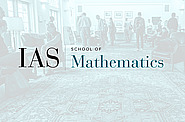2020-21 Seminars
Mar
29
2021
Computer Science/Discrete Mathematics Seminar I
Approximating Max Cut with Subexponential Linear Programs
Tselil Schramm
11:15am|Remote Access - see Zoom link below
Mar
24
2021
Stability and Testability
Why was Connes' embedding conjecture refuted and there are still no known non-hyperlinear groups?
Michael Chapman
11:00am|Remote Access
Mar
23
2021
Computer Science/Discrete Mathematics Seminar II
Amortized circuit complexity, formal complexity measures, and catalytic algorithms
10:30am|Simonyi Hall 101 and Remote Access - see Zoom link below
Mar
22
2021
Computer Science/Discrete Mathematics Seminar I
The abstract chromatic number
Leonardo Nagami Coregliano
11:15am|Remote Access - see Zoom link below
Mar
17
2021
Stability and Testability
Approximate representations of symplectomorphisms via quantization
Leonid Polterovich
11:00am|Remote Access
Mar
16
2021
Computer Science/Discrete Mathematics Seminar II
Polynomial systems and mixed volumes
10:30am|Simonyi Hall 101 and Remote Access - see Zoom link below
Mar
15
2021
Computer Science/Discrete Mathematics Seminar I
Local Proofs with Arbitrarily Small Encoding Overhead
11:15am|Remote Access - see Zoom link below
Mar
10
2021
Stability and Testability
Constraint metric approximation and constraint stability
Liviu Paunescu
11:00am|Remote Access
Mar
09
2021
Computer Science/Discrete Mathematics Seminar II
Random k-out subgraphs
10:30am|Simonyi Hall 101 and Remote Access - see Zoom link below
Mar
08
2021
Computer Science/Discrete Mathematics Seminar I
Strong refutation of semi-random Boolean CSPs
11:15am|Remote Access - see Zoom link below
